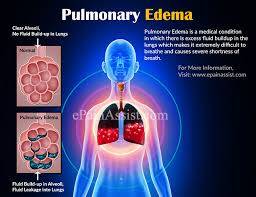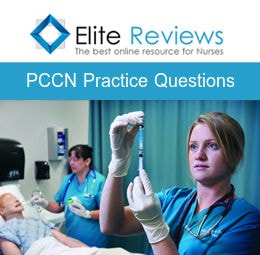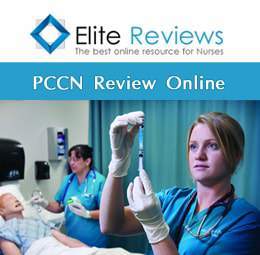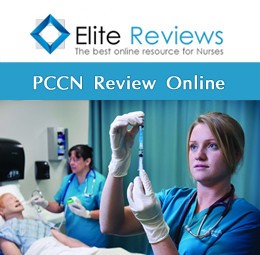PCCN Pulmonary Edema
PCCN Pulmonary Edema
Pulmonary edema is a condition caused by excess fluid in the lungs. This fluid collects in the numerous air sacs in the lungs, making it difficult to breathe.
In most cases, heart problems cause pulmonary edema. But fluid can accumulate for other reasons, including pneumonia, exposure to certain toxins and medications, trauma to the chest wall, and visiting or exercising at high elevations.
Pulmonary edema that develops suddenly (acute pulmonary edema) is a medical emergency requiring immediate care. Pulmonary edema can sometimes be fatal, but the outlook improves if you get treated quickly. Treatment for pulmonary edema varies depending on the cause but generally includes supplemental oxygen and medications.
Signs and Symptoms
Depending on the cause, pulmonary edema signs and symptoms may appear suddenly or develop over time.
- Extreme shortness of breath or difficulty breathing (dyspnea) that worsens with activity or when lying down
- A feeling of suffocating or drowning that worsens when lying down
- Wheezing or gasping for breath
- Cold, clammy skin
- Anxiety, restlessness or a sense of apprehension
- A cough that produces frothy sputum that may be tinged with blood
- Blue-tinged lips
- A rapid, irregular heartbeat (palpitations)
Causes
Cardiogenic pulmonary edema is a type of pulmonary edema caused by increased pressures in the heart.
This condition usually occurs when the diseased or overworked left ventricle isn’t able to pump out enough of the blood it receives from your lungs (congestive heart failure). As a result, pressure increases inside the left atrium and then in the veins and capillaries in your lungs, causing fluid to be pushed through the capillary walls into the air sacs.
Medical conditions that can cause the left ventricle to become weak and eventually fail include:
- CAD, Cardiomyopathy, HTN
- Heart Valve Problems
- ARDS, High Altitudes
- Pulmonary Embolism
- Viral Infections, Toxins
- Smoke Inhalation, Near Drowning
Complications
If pulmonary edema continues, it can raise pressure in the pulmonary artery (pulmonary hypertension), and eventually the right ventricle in your heart becomes weak and begins to fail. The right ventricle has a much thinner wall of muscle than does the left side of your heart because it is under less pressure to pump blood into the lungs. The increased pressure backs up into the right atrium and then into various parts of your body, where it can cause:
- Lower extremity and abdominal swelling
- Buildup of fluid in the membranes that surround your lungs (pleural effusion)
- Congestion and swelling of the liver
Left untreated, acute pulmonary edema can be deadly. In some instances, it may be fatal even if you receive treatment.
Treatment
Giving oxygen is the first step in the treatment for pulmonary edema. You usually receive oxygen through a face mask or nasal cannula — a flexible plastic tube with two openings that deliver oxygen to each nostril. This should ease some of your symptoms.
Your doctor will monitor your oxygen level closely. Sometimes it may be necessary to assist your breathing with a machine such as a mechanical ventilator or one that provides positive airway pressure.
Depending on your condition and the reason for your pulmonary edema, you may also receive one or more of the following medications:
- Diuretics, Morphine
- BP Meds
PCCN National Exam Courses
Overview
- Elite Reviews Offers A Variety Of Online Courses That Will More Than Adequately Help Prepare The Critical Care Nurse To Pass The National Exam.
- Each Course Includes Continuing Education Credit and Sample Questions.
Continuing Education
- Each Of Our Online Courses Has Been Approved Continuing Education Contact Hours by the California Board of Nursing
- Login To Your Account In Order To Access The Course Completion Certificate Once The Course Is Complete.
PCCN Free Trial
- FREE Sample Lecture & Practice Questions
- Available For 24 Hrs After Registration
- Click The Free Trial Link To Get Started – PCCN Free Trial
How It Works
How The Course Works
- First – Purchase The Course By Clicking On The Blue Add To Cart Button – You Will Then Be Prompted To Create A User Account.
- Second – After Creating An Account, All 3 Options (90, 120 or 150 Days) Will Be Listed. Select The Option You Desire And Delete The Other Two.
- Third – You Will Be Prompted To Pay For The Review Using PayPal – After Payment You Will Be Redirected Back To Your Account.
- Last – Click The Start Button Located Within Your Account To Begin The Program
- 125 Prep Questions
- Q & A With Rationales
- Approved For 5 CEU’s
- 90 Days Availability
- Cost $75.00
- 1250+ Prep Questions
- Q & A With Rationales
- Approved For 25 CEU’s
- 90 Days Availability
- Cost $200.00
PCCN Practice Questions Bundle
- 1350+ Prep Questions
- Q & A With Rationales
- Approved For 30 CEU’s
- 90 Days Availability
- Cost $225.00
PCCN Review Course
- Option 1
- Lectures & 1250+ Questions
- Q & A With Rationales
- Approved For 35 CEU’s
- 90 Days Availability
- Cost $275.00
- Option 2
- Lectures & 2000+ Questions
- Q & A With Rationales
- Approved For 40 CEU’s
- 90 Days Availability
- Cost $325.00
PCCN Review Course Bundle
- Option 3
- Lectures & 3000+ Questions
- Q & A With Rationales
- Approved For 70 CEU’s
- 90 Days Availability
- Cost $375.00







